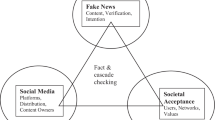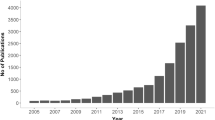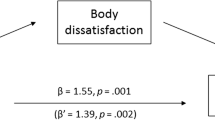ABSTRACT
Physicians and patients increasingly use social media technologies, such as Facebook, Twitter, and weblogs (blogs), both professionally and personally. Amidst recent reports of physician misbehavior online, as well as concerns about social media’s potential negative effect on trust in the medical profession, several national-level physician organizations have created professional guidelines on social media use by physicians. Missing from these guidelines is adequate attention to conflict of interest. Some guidelines do not explicitly mention conflict of interest; others recommend only disclosure. Recommending disclosure fails to appreciate the unique features of social media that make adequate disclosure difficult to accomplish. Moreover, in emphasizing disclosure alone, current guidelines are inconsistent with medicine’s general trend toward management or elimination, not just disclosure, of potential conflicts. Because social media sites typically rely on physicians’ voluntary compliance with professional norms, physicians necessarily play a major role in shaping these norms’ content and scope. To achieve the benefits of social media and ensure the veracity of social media content while preserving trust in the profession, physicians must reaffirm their commitment to disclose potential conflicts; advocate for better electronic disclosure mechanisms; and develop concrete management strategies—including, where necessary, the elimination of conflicts altogether.
Similar content being viewed by others
REFERENCES
Thompson LA, Dawson K, Ferdig R, et al. The intersection of online social networking with medical professionalism. J Gen Intern Med. 2008;23(7):954–7.
Manhattan Research LLC. Taking the Pulse: Physicians and Emerging Information Technologies. New York, NY: Manhattan Research; April 2010.
Fox S. The Social Life of Health Information. Pew Internet & American Life Project. Washington DC: Pew Research Center; 2011.
Modahl, M., Tompsett, L., Moorhead, T. Doctors, Patients & Social Media. QuantiaMD, September 2011. Available at http://www.quantiamd.com/q-qcp/doctorspatientsocialmedia.pdf. Accessed September 26, 2012.
Bosslet GT, Torke AM, Hickman SE, Terry CL, Helft PR. The patient–doctor relationship and online social networks: results of a national survey. J Gen Intern Med. 2012;26(10):1168–74.
Merchant RM, Elmer S, Lurie N. Integrating social media into emergency-preparedness efforts. N Engl J Med. 2011;365:289–91.
Sermo.com. Sermo Highlights Social Media’s Life-Saving Impact on Patient Care. Available at: http://www.sermo.com/news/press-releases/15. Accessed September 26, 2012.
Wicks P, Vaughan TE, Massagli MP, Heywood J. Accelerated clinical discovery using self-reported patient data collected online and a patient-matching algorithm. Nat Biotechnol. 2011;29(5):411–4.
Maier A, Holm T, Wicks P, et al. Online assessment of ALS functional rating scale compares well to in-clinic evaluation: a prospective trial. Amyotroph Lateral Scler. 2012;13(2):210–6.
Yamout SZ, Glick ZA, Lind DS, Monson RA, Glick PL. Using social media to enhance surgeon and patient education and communication. Bull Am Coll Surg. 2011;96(7):7–15.
George DR. “Friending Facebook?” A minicourse on the use of social media by health professionals. J Contin Educ Health Prof. 2011;31(3):215–9.
Sullivan, T. Why the CME community is lacking in its use of social media. Available at: http://www.kevinmd.com/blog/2011/02/cme-community-lacking-social-media.html. Accessed September 26, 2012.
Aronson SH. The Lancet on the telephone 1876–1975. Med Hist. 1977;21(1):69–87.
Jain SH. Practicing medicine in the age of Facebook. N Engl J Med. 2009;361(7):649–51.
Greysen SR, Kind T, Chretien KC. Online professionalism and the mirror of social media. J Gen Intern Med. 2010;25:1227–9.
Chretien KC. Should I be “friends” with my patients on social networking web sites? Am Fam Physician. 2011;84(1):105. 108.
Guseh JS 2nd, Brendel RW, Brendel DH. Medical professionalism in the age of online social networking. J Med Ethics. 2009;35(9):584–6.
Chretien KC, Azar J, Kind T. Physicians on Twitter. JAMA. 2011;305:566–8.
Chretien KC, Greysen SR, Chretien JP, Kind T. Online posting of unprofessional content by medical students. JAMA. 2009;302:1308–15.
MacDonald J, Sohn S, Ellis P. Privacy, professionalism and Facebook: a dilemma for young doctors. Med Educ. 2010;44(8):805–13.
Shore R, Halsey J, Shah K, Crigger BJ, Douglas SP, AMA Council on Ethical and Judicial Affairs (CEJA). Report of the AMA Council on Ethical and Judicial Affairs: professionalism in the use of social media. J Clin Ethics. 2011;22(2):165–172.
Snyder L, American College of Physicians Ethics, Professionalism, and Human Rights Committee. American College of Physicians Ethics Manual, Sixth Edition. Ann Intern Med. 2012;156:73–104.
Federation of State Medical Boards. Medical Policy Guidelines for the Appropriate Use of Social Media and Social Networking in Medical Practice. Available at: http://www.fsmb.org/pdf/pub-social-media-guidelines.pdf. Accessed September 26, 2012.
Canadian Medical Association. Social media and Canadian physicians—issues and rules of engagement. Available at: http://www.cma.ca/socialmedia. Accessed September 26, 2012.
British Medical Association. Using social media: practical and ethical guidance for doctors and medical students. 2011. Available at: http://bma.org.uk/-/media/Files/PDFs/Practical%20advice%20at%20work/Ethics/socialmediaguidance.pdf. Accessed September 26, 2012.
United Kingdom General Medical Council. Doctors’ use of social media: A draft for consultation. Available at: http://www.gmc-uk.org/Draft_explanatory_guidance___Doctors_use_of_social_media.pdf_48499903.pdf. Accessed September 26, 2012.
Mansfield SJ, Morrison SG, Stephens HO, et al. Social media and the medical profession. Med J Aust. 2011;194(12):642–4.
Derse AR, Miller TE. Net effect: professional and ethical challenges of medicine online. Camb Q Healthc Ethics. 2008;17(4):453–64.
Mostaghimi A, Crotty BH. Professionalism in the digital age. Ann Intern Med. 2011;154(8):560–562.
McGee SJ. To friend or not to friend. Is that the question for healthcare? Am J Bioeth. 2011;8:2–5.
Leiker M. When to ‘friend’ a patient: social media tips for healthcare professionals. WMJ. 2011;110(1):42–3.
Kind, T., Genrich, G., Sodhi, A., Chretien, K.C. Social media policies at US medical schools. Med Educ Online. 2010;15:5324. doi:10.3402/meo.v15i0.5324.
Blumenthal D. Doctors and drug companies. N Engl J Med. 2004;351(18):1885–90.
Watkins C, Moore L, Harvey I, Carthy P, Robinson E, Brawn R. Characteristics of general practitioners who frequently see drug industry representatives: national cross sectional study. BMJ. 2003;326:1178–9.
Shrank WH, Choudhry NK, Swanton K, et al. Variations in structure and content of online social networks for patients with diabetes. Arch Intern Med. 2011;171(17):1589–91.
Greene JA, Choudhry NK, Kilabuk E, Shrank WH. Online social networking by patients with diabetes: a qualitative evaluation of communication with Facebook. J Gen Intern Med. 2011;26(3):287–92.
Lexchin J, Bero LA, Djulbegovic B, Clark O. Pharmaceutical industry sponsorship and research outcome and quality: systematic review. BMJ. 2003;326(7400):1167–70.
Ghinn, D. Pharma gets social: Pharma lessons in social media and clinical trials. March 21, 2012. Available at: http://www.pharmaphorum.com/2012/03/21/pharma-gets-social-pharma-lessons-social-media-clinical-trials/. Accessed September 26, 2012.
Blue Chip Patient Recruitment. Engaging E-patients in Clinical Trials through Social Media. March 2011. Available at: http://bluechipmarketingworldwide.com/BCPR_form/BlueChip_SocialMedia_5-2011.pdf. Accessed September 26, 2012.
Ramo DE, Prochaska JJ. Broad reach and targeted recruitment using Facebook for an online survey of young adult substance use. J Med Internet Res. 2012;14(1):e28.
Zipkin DA, Steinman MA. Interactions between pharmaceutical representatives and doctors in training. A thematic review. J Gen Intern Med. 2005;20(8):777–86.
Farnan JM, Paro JA, Higa JT, Reddy ST, Humphrey HJ, Arora VM. Commentary: The relationship status of digital media and professionalism: it’s complicated. Acad Med. 2009;84(11):1479–81.
Lagu T, Kaufman EJ, Asch DA, Armstrong K. Content of weblogs written by health professionals. J Gen Intern Med. 2008;23(10):1642–1646.
Hesse BW, Nelson DE, Kreps GL, et al. Trust and sources of health information: the impact of the Internet and its implications for health care providers: findings from the first Health Information National Trends Survey. Arch Intern Med. 2005;165(22):2618–24.
Price Waterhouse Cooper Health Research Institute. Social media “likes” healthcare. April 2012. Available at: http://www.pwc.com/us/en/health-industries/publications/health-care-social-media.jhtml. Accessed September 26, 2012.
Loewenstein G, Cain DM, Sah S. The limits of transparency: pitfalls and potential of disclosing conflicts of interest. AER Papers Proc. 2011;101(3):423–428.
Compilation of Patient Protection and Affordable Care Act. 111th Congress, 2nd session. Title VI. Subtitle A. Section 6002. May 1, 2010.
Bovi AM, Council on Ethical and Judicial Affairs of the American Medical Association. Use of health-related online sites. Am J Bioeth. 2003;3(3):W-IF3.
Gibbons RV, Landry FJ, Blouch DL, et al. A comparison of physicians’ and patients’ attitudes toward pharmaceutical industry gifts. J Gen Intern Med. 1998;13(3):151–4.
Lo B, Field MJ, for the Committee on Conflict of Interest in Medical Research, Education, and Practice. Conflict of interest in medical research, education and practice. Washington DC: The National Academies Press; 2009.
Council of Medical Specialty Societies. Code for Interactions with Companies. March 2011. Available at: http://cmss.org/codeforinteractions.aspx. Accessed September 26, 2012.
Steinman MA, Landefeld CS, Baron RB. Industry support of CME—are we at the tipping point? N Engl J Med. 2012;366:1069–71.
International Committee of Medical Journal Editors. ICMJE Form for Disclosure of Potential Conflicts of Interest. Available at: http://www.icmje.org/coi_disclosure.pdf. Accessed September 26, 2012.
Loewenstein G, Sah S, Cain DM. The unintended consequences of conflict of interest disclosure. JAMA. 2012;307:669–70.
Lesser CS, Lucey CR, Egener B, Braddock CH 3rd, Linas SL, Levinson W. A behavioral and systems view of professionalism. JAMA. 2010;304:2732–7.
Acknowledgments
None
Funders
This research was supported by a Greenwall Post-doctoral Fellowship in Bioethics and Health Policy. The funding source had no role in the design and conduct of the study; collection, management, analysis, and interpretation of the data; or preparation, review, and approval of the manuscript.
Conflict of Interest
The author declares that he does not have a conflict of interest.
Author information
Authors and Affiliations
Corresponding author
Rights and permissions
About this article
Cite this article
DeCamp, M. Physicians, Social Media, and Conflict of Interest. J GEN INTERN MED 28, 299–303 (2013). https://doi.org/10.1007/s11606-012-2251-x
Received:
Revised:
Accepted:
Published:
Issue Date:
DOI: https://doi.org/10.1007/s11606-012-2251-x




